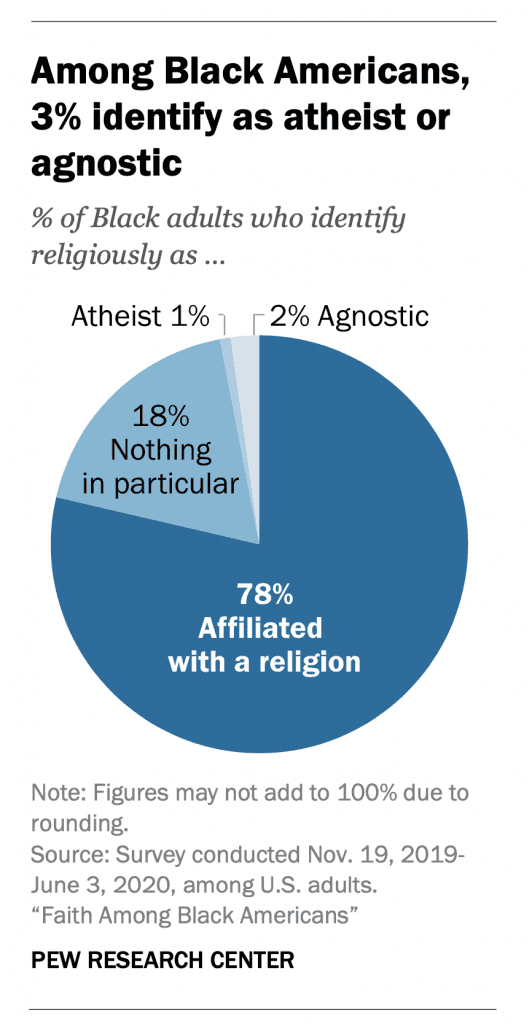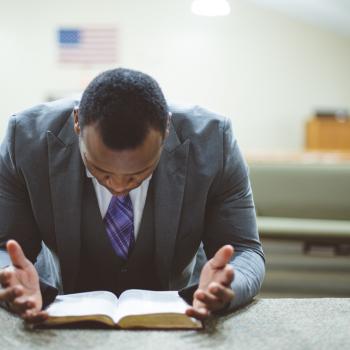FEBRUARY 16, 2021
A major new survey released today by the Pew Research Center finds that roughly 21% of Black Americans are not affiliated with any organized religion. And when you look to younger members of that demographic, the number only gets larger.
Before you get excited though, the survey also finds that those Black “Nones” are almost entirely people who believe in something even if they don’t have a particular religious label.

As is true within the general U.S. population, the share of people who do not identify with any religion is increasing among Black Americans. This religiously unaffiliated category (sometimes called religious “nones”) includes those who describe themselves as atheist, agnostic or “nothing in particular” when asked about their religion. Most Black religious “nones” (18% of all Black Americans) identify as “nothing in particular,” while far fewer describe themselves as agnostic (2%) or atheist (1%). The survey finds, furthermore, that many Black religious “nones” hold favorable views about Black churches and show numerous signs of religious or spiritual engagement.
That skewed result means most Black Americans with no religious affiliation still believe in a higher power (90%) and pray at least a few times a month (54%). A large number of them also think reincarnation is real (47%).
Those numbers are obviously much smaller among the tiny slice of atheists and agnostics, but not always by as much as you’d think.
Here’s perhaps the bigger takeaway: Even among those Nones, about two in three Black Americans believe the Black church is a force for good. That makes being a Black atheist that much harder because leaving the church may mean (or at least be perceived as) turning your back on your community. Pointing out the illogic of religious thought, or a list of Bible contradictions, or noting the problem with conservative Christianity won’t have as much of an impact on Black Americans, then, if the goal is to steer them away from the faith. That’s because the church represents so much more than just a particular belief that may be harmful; for many people, it’s the center of their lives even when they stop believing in the supernatural.
While the data set here is larger than usual, in order to get a better indication of beliefs within the Black population, it’s possible the methods used to collect the data led to an undercounting of atheists. That’s the first reaction Mandisa Thomas of Black Nonbelievers had. She said to me:
I am curious about the distribution for this survey. While I am pleased with rise of the religiously unaffiliated within the Black community, it is almost ludicrous that only 1-2 percent would be noted as atheist/agnostic. My work with Black Nonbelievers has proven that there are indeed more of us, so I am concerned about the who’s and where’s, and if the definitions were accurately spelled out for the participants.
This does, however, show the need for organizations like BN, and why increasing the presence of openly identified Black atheists/agnostics is important. We are still facing uphill battles, and while our goal isn’t to eradicate religion, we must continue to work on our support methods as a whole so that more are comfortable taking surveys like this without fear of retribution of any kind.
The thinking here is that a lot of people may not believe in God but don’t necessarily use the “atheist” label. If they were asked to self-categorize themselves, then, the number of atheists may be lower than expected. Having anonymity in these surveys also makes a difference. Pew said that in order to get enough data, they used “a combination of four, high-quality, probability-based samples. The study also featured multiple response modes: online, a paper version or live telephone.” That doesn’t mean the information is wrong — only that different surveys with different methodologies may yield different results.
Either way, though, it’s hard to imagine the gist of those results deviates too much from these numbers. Most Black people unaffiliated with a religious faith still believe in something; being openly atheist is still a relative rarity among Black Americans.
Like Thomas said, though, one way to change that is for more people within that group to speak out boldly, for the rest of us to offer them support however possible, and to help them create communities where they feel comfortable enough to not hide this side of themselves.
It also means atheists as a whole need to recognize that different Americans can’t be reasoned out of religion the same way. There’s no one-size-fits-all route to deconversion. As much as some people think logic is colorblind, the way Americans interact with religion changes depending on the group, therefore the way atheists discuss faith must take that into account or else they won’t be effective communicators.
(Featured image via Shutterstock)
